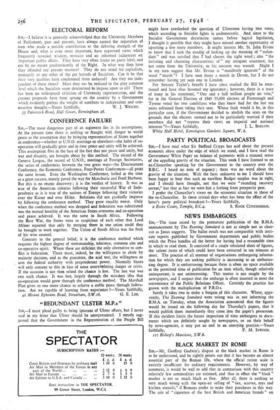CONFERENCE FAILURE
, SIR,—The most dangerous part of an argument lies in its assumptions. At the present time there is nothing so fraught with danger to world peace as the assumption that by bringing representatives of States together in conference—whether at U.N.O. meetings or elsewhere—the habit of co- operation will gradually grow and in time peace and unity will be achieved. This assumption flies in the face of the fact that not peace and unity, but war and disunity, are brought about by this method. The record of the Geneva League, the record of U.N.O., meetings of Foreign Secretaries, the series of conferences between the two great wars—the Disarmament Conference, the Economic Conference, Four-Power Conferences—all point the same lesson. Even the Washington Conference, hailed at the time as a great success, merely paved the way for Manchuria and Pearl Harbour. But this is no recent discovery ; it is the 'verdict of history. It was as true of the American colonies following their successful War of Inde- pendence as it is true of the nations of Europe following their victories over the Kaiser and over Hitler. Relations did not gradually improve by following the conference method. They grew steadily worse. Only when the conference method was -dropped and federation was substituted was the mutual hostility of the American States overcome and co-operation and peace achieved. It was the same in South Africa. Following the Boar War, the States were so suspicious of each other that Lord Milner reported that only by merging them in one union could they be brought to work together. The Union of South Africa was the fruit of his wise counsel.
Contrary to the general belief, it is the conference method which requires the highest degree of statesmanship, tolerance, common aim and co-operative spirit. Where these are deficient the only alternative to con- flict is federation. There must, indeed, be the willingness to abide by majority decision, and as the guarantee, the acid test, the willingness -to arm the federal authority with preponderant power. Normally States will only consent to this in face of some overwlfehning danger or crisis. If the occasion is not then seized the chance is lost. The late war was one such chance. It was lost, largely through the mistaken idea that co-operation would grow through the conference method. The Marshall Plan gives us one more chance to achieve a stable peace through federa- tion. Are we capable of learning from experience ?—Yours faithfully, 41 Mount Ephraim Road, Streatham, S.W.i6. G. E. LEE.


































 Previous page
Previous page